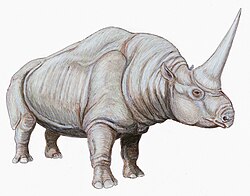| Kalobatippus | |
|---|---|
 | |
| K. agatensis skull, American Museum of Natural History | |
| Scientific classification | |
| Kingdom: | Animalia |
| Phylum: | Chordata |
| Class: | Mammalia |
| Order: | Perissodactyla |
| Family: | Equidae |
| Subfamily: | † Anchitheriinae |
| Genus: | † Kalobatippus Osborn, 1915 |

Kalobatippus ('stilt walking horse') is a genus of anchitheriinae equid. It gets its name from the elongated bones between the ankle/wrist and the toes. [1] Kalobatippus ate leaves and was characterized by unusually long legs. It lived 24 to 19 million years ago. [2] Estimated body mass for Kalobatippus is 131.7 kg (290 lb). [3]








